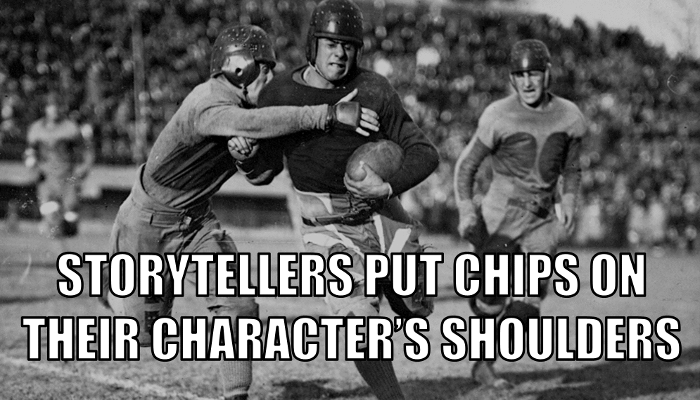
Martellus Bennet plays Tight End for the New England Patriots. When asked about his motivations to play such a brutal game, his response offered a textbook answer for those studying the art of storytelling.
“You can’t play this game without a chip on your shoulder…” he said.
In StoryHow™ language, a chip represents a character’s motivation–the reason why someone chooses to act in a certain way. All characters, whether fictional or a real-world, have chips. Your job as a storyteller is to dig in and find them.
The StoryHow™ PitchDeck’s Influence suit helps storytellers uncover chips:
| 31. Jeopardy | 36. Response: Instinctive | 41. Knowledge |
| 32. Choice: Emotional | 37. Choice: Moral | 42. Who knows what? |
| 33. Choice: Logical | 38. Choice: Faith | 43. Mistaken Identity |
| 34. Choice: Obligation | 39. Choice: Guilt | 44. No Need |
| 35. Choice: Gut | 40. Throughline | 45. Context |
Let’s take a closer look at Martellus Bennet’s chips in StoryHow™ terms:
I play for my family first and foremost,” he said. “My daughter and my wife are what drives me to continue to go. My brothers and my mom and my dad — I play for my family. That’s why I have a different edge than a lot of guys out there, because I feel like if they’re trying to stop me, they’re trying to take food out of my daughter’s mouth at the same time.
Martellus has three chips. He’s motivated to take care of his family through Instinct (SHPD #36) and Obligation (SHPD #34). At the same time, on-field opponents place his ability to take care of his family into Jeopardy (SHPD #31).
Before you write any story, create a list of characters. Write what each wants. Then, list each chip–the motivations behind why they want those things. Audiences relate the strongest with characters whose actions align tightly with what they want and why they want them.
Photo Credit: [Football Game]. [Between 1920 and 1930?] Image. Retrieved from the Library of Congress, https://www.loc.gov/item/2013645852/